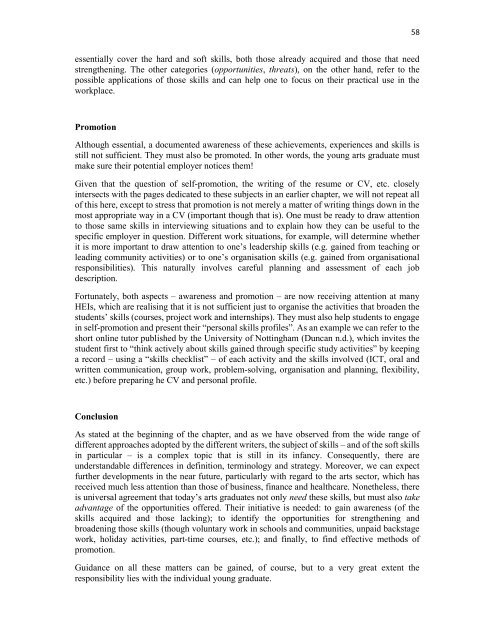and Music
Omega-Book
Omega-Book
You also want an ePaper? Increase the reach of your titles
YUMPU automatically turns print PDFs into web optimized ePapers that Google loves.
58<br />
essentially cover the hard <strong>and</strong> soft skills, both those already acquired <strong>and</strong> those that need<br />
strengthening. The other categories (opportunities, threats), on the other h<strong>and</strong>, refer to the<br />
possible applications of those skills <strong>and</strong> can help one to focus on their practical use in the<br />
workplace.<br />
Promotion<br />
Although essential, a documented awareness of these achievements, experiences <strong>and</strong> skills is<br />
still not sufficient. They must also be promoted. In other words, the young arts graduate must<br />
make sure their potential employer notices them!<br />
Given that the question of self-promotion, the writing of the resume or CV, etc. closely<br />
intersects with the pages dedicated to these subjects in an earlier chapter, we will not repeat all<br />
of this here, except to stress that promotion is not merely a matter of writing things down in the<br />
most appropriate way in a CV (important though that is). One must be ready to draw attention<br />
to those same skills in interviewing situations <strong>and</strong> to explain how they can be useful to the<br />
specific employer in question. Different work situations, for example, will determine whether<br />
it is more important to draw attention to one’s leadership skills (e.g. gained from teaching or<br />
leading community activities) or to one’s organisation skills (e.g. gained from organisational<br />
responsibilities). This naturally involves careful planning <strong>and</strong> assessment of each job<br />
description.<br />
Fortunately, both aspects – awareness <strong>and</strong> promotion – are now receiving attention at many<br />
HEIs, which are realising that it is not sufficient just to organise the activities that broaden the<br />
students’ skills (courses, project work <strong>and</strong> internships). They must also help students to engage<br />
in self-promotion <strong>and</strong> present their “personal skills profiles”. As an example we can refer to the<br />
short online tutor published by the University of Nottingham (Duncan n.d.), which invites the<br />
student first to “think actively about skills gained through specific study activities” by keeping<br />
a record – using a “skills checklist” – of each activity <strong>and</strong> the skills involved (ICT, oral <strong>and</strong><br />
written communication, group work, problem-solving, organisation <strong>and</strong> planning, flexibility,<br />
etc.) before preparing he CV <strong>and</strong> personal profile.<br />
Conclusion<br />
As stated at the beginning of the chapter, <strong>and</strong> as we have observed from the wide range of<br />
different approaches adopted by the different writers, the subject of skills – <strong>and</strong> of the soft skills<br />
in particular – is a complex topic that is still in its infancy. Consequently, there are<br />
underst<strong>and</strong>able differences in definition, terminology <strong>and</strong> strategy. Moreover, we can expect<br />
further developments in the near future, particularly with regard to the arts sector, which has<br />
received much less attention than those of business, finance <strong>and</strong> healthcare. Nonetheless, there<br />
is universal agreement that today’s arts graduates not only need these skills, but must also take<br />
advantage of the opportunities offered. Their initiative is needed: to gain awareness (of the<br />
skills acquired <strong>and</strong> those lacking); to identify the opportunities for strengthening <strong>and</strong><br />
broadening those skills (though voluntary work in schools <strong>and</strong> communities, unpaid backstage<br />
work, holiday activities, part-time courses, etc.); <strong>and</strong> finally, to find effective methods of<br />
promotion.<br />
Guidance on all these matters can be gained, of course, but to a very great extent the<br />
responsibility lies with the individual young graduate.


